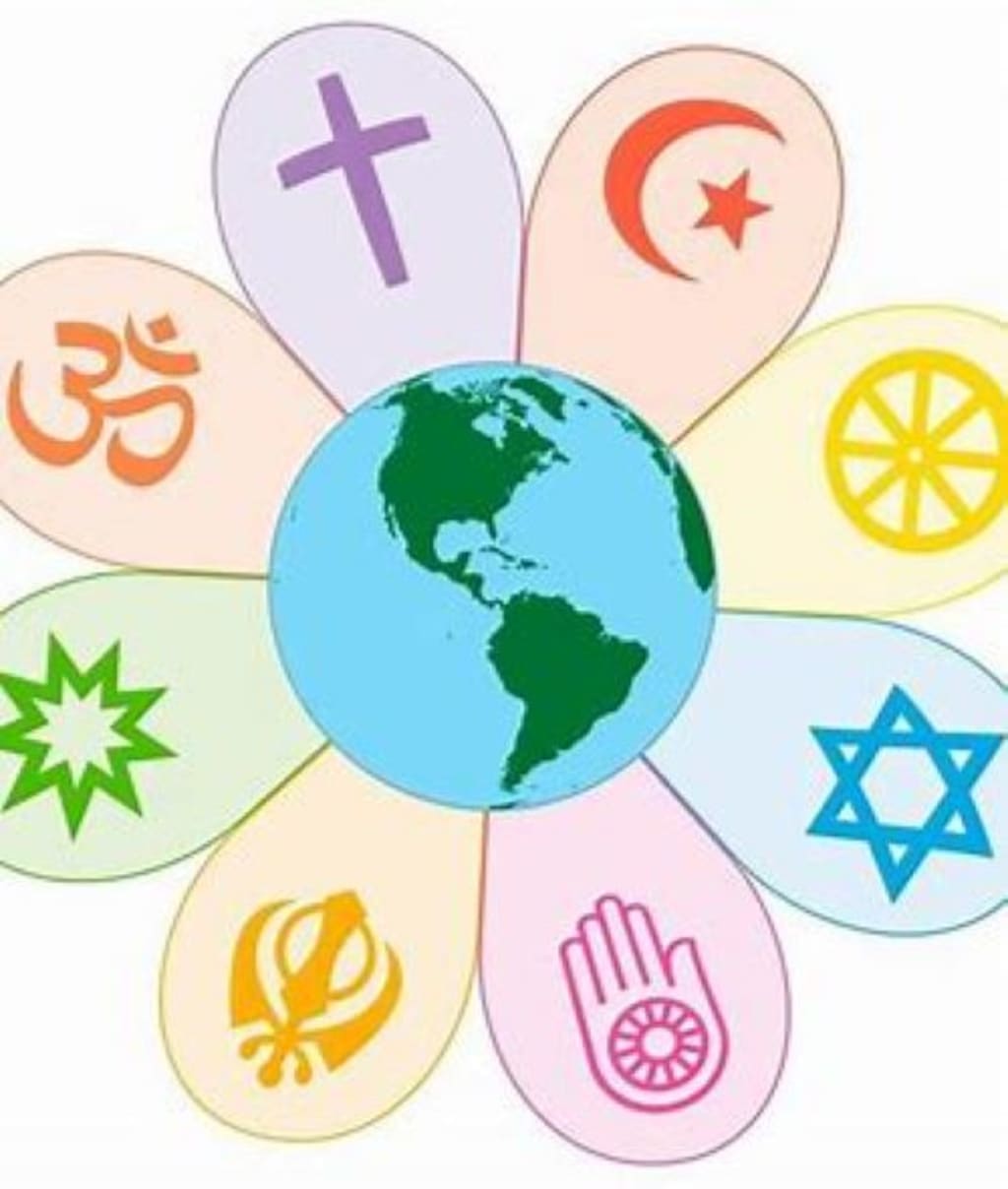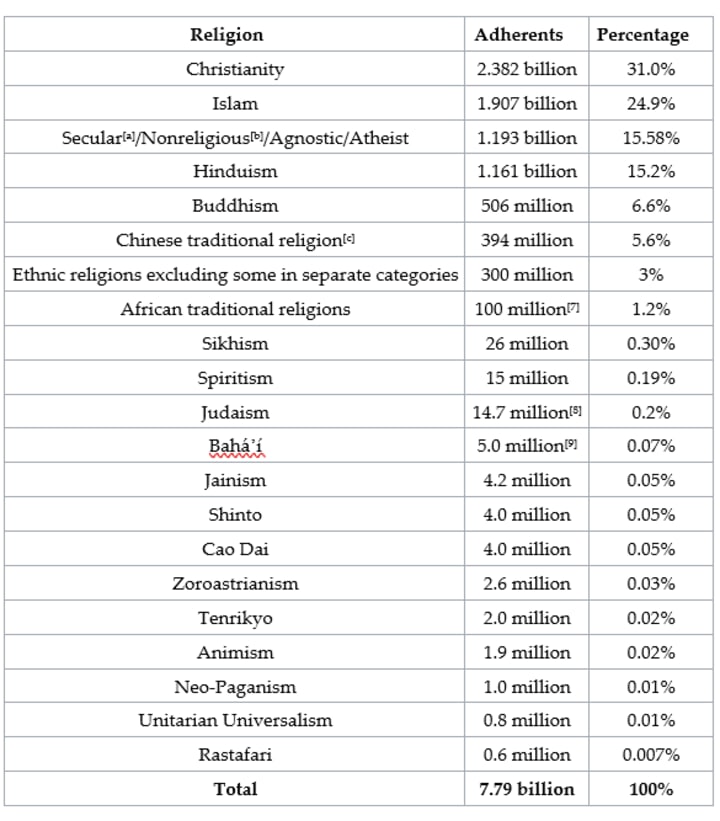The Most Ancient Belief Systems

I remember asking my mother when I was about 14, I asked her “If Jesus is the Way, why are there so many religions in the world that don’t believe in Jesus but have other beliefs.” And she replied, “Julie, God presents himself to people in different ways and they interpret his teachings in different ways.” Basically, validating that everyone’s belief system is true to them. I was raised Lutheran; although I converted to Catholicism as an adult as it resonates much stronger to me than Lutheranism. Again, affirming we are all on different pathways to enlightenment.
I think about that a lot especially when I see so much hatred, confusion and violence that comes out people’s intolerance for other’s beliefs. As humans, we are fallible. None of us are entirely "right" and none of us are entirely "wrong." Don't get me wrong, I am not some sheep with blinders on, I know there are SIGNIFICANT ethical and moral problems in organized religion and that power has been abused in the name of God over and over again throughout millennium. However, that does not completely tarnish the thousands of years of studying, learning and divine inspiration that has brought us organized religion by so many wise and enlightened humans. We cannot learn without each other and intolerance blocks knowledge.
I thought I would write a little bit about the oldest religions in the world. If nothing else, knowing a little bit helps tolerance. Focus on acceptance and love and understand that you can learn from everyone, even the person you have judged to be irredeemable.
Eight Oldest Religions in the World
Written history is about 5,000 years old, but religion has most likely been around since mankind’s origins. Although it is not uncommon for a religion to claim to have knowledge from the dawn of time, spiritual practices and beliefs have emerged, changed and faded out of history as often as empires.
That said, some have stood the test of time simply because there is divine truth in their teachings. Mankind is borne with skepticism and the fact that so many have found truth in these religions gives them credence.
Science is not infallible, and many renowned scientists are men of faith. Remember not that long ago, it was scientifically thought that the world was flat, that applying leeches to sick people and or bleeding them out would cure them of diseases, that lobotomies helped mental disease, and even as late as the 1750’s it was thought that sperms were little tiny fully formed humans that were “planted” in the garden of the woman’s garden until they grew. Hence creating the myth that male masturbation was murder.
Many large religious movements have been lost to history, but several ancient religions are still practiced today and are outlined below.
It’s important to note that while a few of the following religions can definitively trace their origins, overall, it’s almost impossible to know exactly when most religions emerged and were embraced.
Taoism (Circa 500 BCE)
Country or Region of Origin: China
Number of Current Followers: ~ 20 Million
Taoism (also called Daoism) is based on the teachings of the Tao Te Ching, a short book containing the teachings of Lao Tzu and emphasizes spiritual harmony within the individual.
Although there isn’t a sharp distinction today, there are two main schools within Taoism: philosophical Taoism (Tao-chia) and religious Taoism (Tao-chaio). Tao-chia tends to focus on the writings of Lao Tzu, Chuang-Tzu, and other early mystics. Tao-chaio, meanwhile, emphasizes religious rituals aimed at attaining immortality.
The idea of unity and opposites or Ying and Yang is one of the best-known facets of Taoism. The main idea behind Yin Yang is that the world is filled with complementary forces such as action and non-action, light and dark, hot and cold, etc.
Prior to the Communist revolution, Taoism was one of China’s strongest religions and it has recovered somewhat today as it is practiced in China, Taiwan, Southeast Asia, and in the West.
Confucianism (Circa 600 BCE)
Country or Region of Origin: China
Number of Current Followers: ~ 6 Million
Confucianism is often recognized as a religion although it is not practiced as a traditional organized religion and its believers view it more as a system of social and ethical philosophy.
The religion gets its name from its founder, Confucius (an Anglicization of his actual name K’ung-fu-tzu, or Master K’ung). He did not set out to create a new religion, but was interested in reviving the values and beliefs of the Zhou dynasty.
Throughout the years, Confucianism has had a strong influence on the spiritual and political life of the Chinese people. Its influence has spread to other parts of East Asia including Japan, Korea, and Vietnam.
Jainism (Circa 600 BCE)
Country or Region of Origin: India
Number of Current Followers: ~ 4.2 Million
Jainism is another ancient religion from India that is believed to have emerged in the 6th Century BCE, around the same time as Buddhism, and shares similar beliefs to both Hinduism and Buddhism.
The religion does not have a single religious text to draw from and its adherents believe instead that the truth has been revealed at different times by tirthankara (prophets), who have achieved the highest spiritual goal of existence.
Followers of Jainism believe that there have been 24 tirthankara and that the last of them was Mahavira, who is credited as the founder of Jainism and was also a contemporary of Buddha.
Buddhism (Circa 600 BCE)
Country or Region of Origin: Indian Subcontinent (Modern-day Nepal)
Number of Current Followers: ~ 500 Million
Unlike most of the other ancient religions, Buddhism can trace its roots back to one founder. Buddhism’s founder was a prince born in modern-day Nepal over 2,500 years ago named Siddhartha Gautama.
According to Buddhist history, Siddhartha Gautama cast aside his luxurious life as a prince after he witnessed the suffering outside the palace walls for the first time. After that, he sat beneath the Bodhi tree (the tree of awakening) and eventually reached enlightenment, thus becoming the Buddha.
Since then, followers of Buddhism practice the Buddha’s peaceful teachings and seek the path of enlightenment for themselves.
Shinto (Circa 700 BCE)
Country or Region of Origin: Japan
Number of Current Followers: ~ 4 Million
While many people believe that Shinto did not officially begin until after Buddhism was introduced to Japan around the 6th Century BCE, there is recorded history mentioning Shinto’s roots from around 700 BCE, although archaeological records date back further.
After Buddhism arrived, many Buddhist elements were mixed into Shinto faiths and traditions, as well as Confucian ones.
The ruling aristocracy eventually combined all three religions and developed Shinto as a way to guide Japan’s people — Shinto was officially designated as Japan’s state religion during the Meiji Period (1868 – 1912).
Today Shinto as well as Buddhism is closely tied to Japan’s society and culture.
Zoroastrianism (Circa 1,500 BCE)
Country or Region of Origin: Ancient Persia (Modern-day Iran)
Number of Current Followers: ~ 2.6 million
Although Zoroastrianism was officially founded in the 6th Century BCE by the prophet and reformer Zoroaster, through archaeological evidence, the religion’s roots may date back between 1,200 – 1,500 BCE. At one point in history, Zoroastrianism was one of the most powerful religions in the world and served as the official religion of Persia from 600 BCE to 650 BCE.
Zoroastrians believe in one God called Ahura Mazda and contrary to popular belief, are not fire worshippers — they believe that fire represents God’s light or wisdom.
While Zoroastrianism is a fairly small religion by comparison, it shares many central concepts with major religions such as Judaism, Christianity, and Islam.
Judaism (Circa 2,000 BCE)
Country or Region of Origin: Southern Levant (Modern-day Israel, Palestine, and Jordan)
Number of Current Followers: ~ 14.7 Million
Judaism is the oldest of the three monotheistic Abrahamic faiths, with the other two religions being Christianity and Islam. The religion was officially founded by Moses, although Jewish history can be traced back to Abraham, who is considered to be the ancestor of the Jewish people.
While Judaism has many important and sacred texts, its most important religious document is the Torah, which is part of a larger text known as the Tanakh or Hebrew Bible.
Modern Judaism can be separated into three movements: Orthodox Judaism, which is the most conservative and retains nearly all traditional practices and rituals; Reform Judaism, whose followers retain their Jewish identity but take a more liberal and relaxed approach to many beliefs and practices; and Conservative Judaism, which lies in the middle and takes a moderate approach to Jewish practices.
Hinduism (Circa 7,000 BCE)
Country or Region of Origin: Indus River Valley (Modern-day Pakistan)
Number of Current Followers: ~ 1.6 billion
Hinduism is often considered the oldest existing religion still practiced today. While this may be true, it’s important to note that Hinduism does not have any particular founder or a single text, but instead combines several ancient traditions and beliefs.
The oldest scripture of Hinduism is the Rig Veda, which is believed to be about 3,500 years old. However, archaeologists have found bull and cow motifs, which are sacred animals in Hinduism, dating back to around 7,000 BCE during a time when an ancient civilization inhabited the area near the Indus River.
Today, Hinduism is practiced by millions of people around the world, but primarily in India and the surrounding countries.
Keep in mind, these are the 8 oldest religions, not the current largest with the most adherents. According to Pew Research in 2020, below is an accounting of the followers of different religions to give you some perspective.

When you look at the numbers, clearly, we are primarily spiritual beings being led by forces greater than ourselves. Our challenge is to release our ego and accept that we may not be the ‘only way’ and to respect other people’s choices.
- Julie O'Hara 2023
Thank you for reading my poem or article. Please feel free to subscribe to see more content and if you are moved to, please consider tipping. In addition, my books can be found at https: Julie O'Hara Bookshop
About the Creator
Julie O'Hara - Author, Poet and Spiritual Warrior
Thank you for reading my work. Feel free to contact me with your thoughts or if you want to chat. [email protected]
Enjoyed the story? Support the Creator.
Subscribe for free to receive all their stories in your feed. You could also pledge your support or give them a one-off tip, letting them know you appreciate their work.






Comments
There are no comments for this story
Be the first to respond and start the conversation.